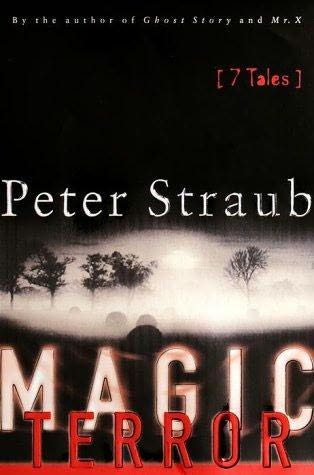
Magic Terror
7 Tales
- اطلاعات
- نقد و بررسی
- دیدگاه کاربران
نقد و بررسی

May 29, 2000
The war-numbed soldier who asks, "Just suppose...,that you were forced to confront extreme experience directly, without any mediation?" speaks for all of the spiritually traumatized souls who navigate the harrowingly rendered hells of these seven tales of suspense and horror. Straub (Mr. X) effortlessly plumbs the hearts and minds of a range of well-developed characters--including a reflective assassin for hire, a five-year-old victim of domestic violence, an aging black jazz musician and a pompous Wall Street financial adviser--to locate epiphanic moments when their lives careened "out of the ordinary" and into the path of deforming private tragedy. In "Ashputtle," an implied murderess blames her crimes on an emotionally deprived childhood in which she imagines herself a modern Cinderella victimized by her cruel stepsisters. "Bunny Is Good Bread," an unnerving portrait of the psychopath as a young boy, follows young Fee Bandolier as he maladjusts to an unbearably gothic home situation in which his father has beaten his mother into a coma. "Porkpie Hat" is related as an alcoholic saxophonist's confession of a childhood brush with witchcraft, murder and miscegenation that continues to inform his blues-haunted music. In several of the tales--most notably "The Haunted Village," which links to the novel Koko (1988) and stories from his previous collection, Houses Without Doors (1990)--Straub skillfully evokes the supernatural to suggest the dislocating effect of intense psychological upset. Mixing stark realism with black comedy, and reverberating with echoes of Conrad, Melville and the Brothers Grimm, these excursions to the dark side of life set a high standard for the literature of contemporary magic terror.

March 1, 2000
A scary story collection from Straub, including the award-winning novella Mr. Clubb and Mr. Cuff.
Copyright 2000 Library Journal, LLC Used with permission.

Starred review from April 15, 2000
Straub is a horror specialist as literate and adroit as the king of horror hill (and Straub's collaborator in "The Talisman," 1985), Stephen King. Like every other popular fiction writer, he has to concentrate on novels--that's where the money is. But he is better at lesser length, as the brilliant stories in "Houses without Doors" (1990) proved and these seven confirm. Straub depends much less on the supernatural than most of his peers, preferring the all-too-natural horrors of sociopathology. Oh, he throws in a ghost reasonably often. There are several in the Vietnam War tale "The Ghost Village" --a far more eerie "Heart of Darkness" variation than the movie "Apocalypse Now"and in "Hunger, an Introduction," in which a conceited, nebbishy shade explains or, rather, exemplifies why ghosts haunt. A single ghost is in "Porkpie Hat," a daring leap in phony biography based upon the final months and the boyhood of jazz great Lester Young. There are no ghosts in the fairy-tale parallel, "Ashputtle," and the slice of the dark side of child life, "Bunny Is Good Bread"; both instead depict serial murderers, one full-blown and the other in the making, and are made grimmer by Straub's stylistic restraint. "Isn't It Romantic?" gives us a professional serial killer--a hit man as ingratiatingly cunning as any in the thriller literature--who is trying to retire in one piece; think Eric Ambler collaborating with Elmore Leonard to get the flavor of this jeu d'esprit. The longest story in the book, "Mr. Clubb and Mr. Cuff," is forthright in its indebtedness in motif and ironic, high-facetious diction to Herman Melville's ghastly moral fables, especially "Bartleby." Horror stories do not come any juicier than these arsenic-laced literary cordials. ((Reviewed April 15, 2000))(Reprinted with permission of Booklist, copyright 2000, American Library Association.)




دیدگاه کاربران